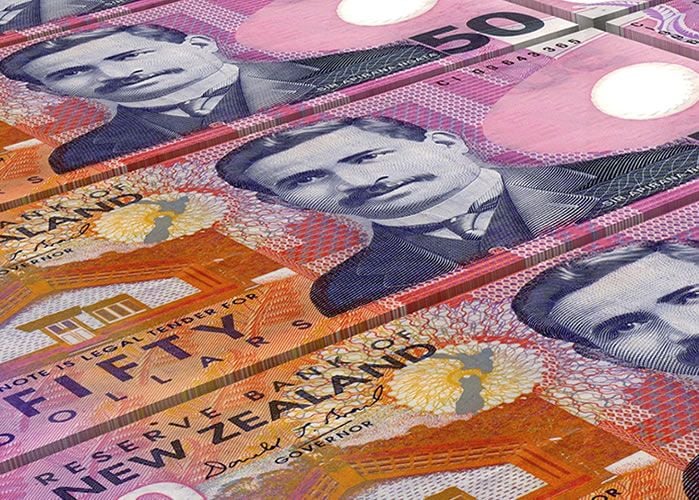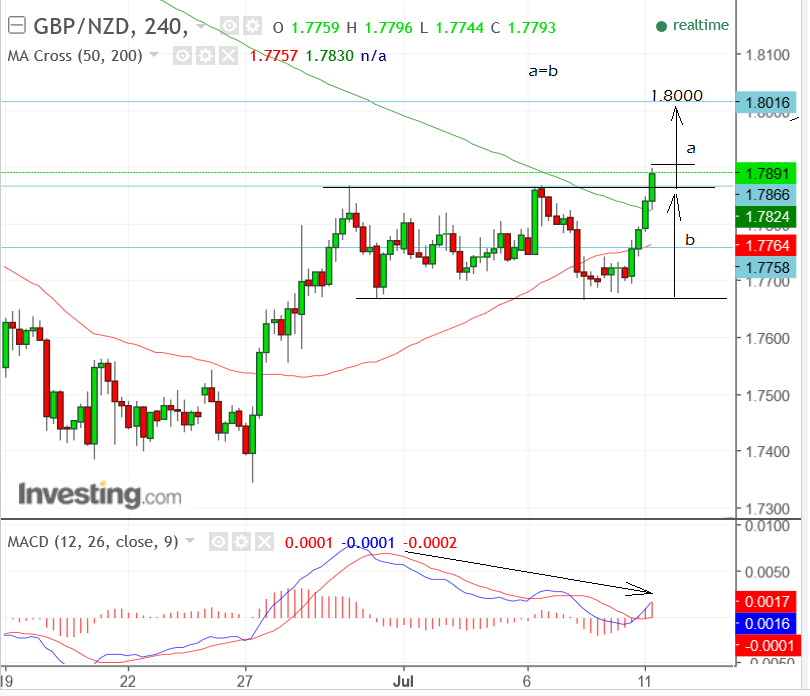Pound / New Zealand Dollar Pair Breaking Out

The Pound to New Zealand Dollar exchange rate (GBP/NZD) has been trading in a holding pattern between 1.7765 and 1.7865 for the past week and is only just showing signs of breaking out higher today (Tuesday, July 11).
The exchange rate has risen an eye-opening 0.8% by the time of writing having reached 1.7849.
Assuming the breakout holds, our latest technical studies of the pair suggest it will probably rise up higher, towards the next target at 1.8000.

Breakouts from sideways ranges normally move the same distance as the height of the range (b) extrapolated above (a) or below, or at least a Fibonacci 61.8% ratio of the height.
There is a possibility, therefore, of a continuation higher towards the 1.8000 target, which would gain confirmation from a break above the 1.7915 level.
Best of New Zealand Dollar's Strength Might Now Have Passed
For the New Zealand Dollar, it would appear that the balance of risks against its G10 partners is to the downside.
The NZD has been one of the better-performing members amongst the group-of-ten of the world’s largest currencies over recent years but we are seeing notable shifts in the global financial system that could question this strength.
The NZD is at risk of losing value as New Zealand's superior interest rate yields are diminished by a growing desire amongst other developed-nation central banks to start raising interest rates.
A recent bond ‘tantrum’ has led to a rise in US, EU and UK yields which has reduced the appeal of borrowing funds in Euros, Dollars and Pounds to buy New Zealand bonds - a dynamic has traditionally supported NZD.
While other central banks are looking to raise rates in the future, the Reserve Bank of New Zealand (RBNZ) is unlikely to raise their own interest rates that would see New Zealand maintain its yield advantage.
Get up to 5% more foreign exchange by using a specialist provider. Get closer to the real market rate and avoid the gaping spreads charged by your bank for international payments. Learn more here.
BNZ’s Stephen Toplis believes the RBNZ will be reluctant to pursue higher interest rates as growth rates are set to fade in the New Zealand economy.
He points out, for example, that the first quarter GDP woefully undershot expectations of 0.9% by coming out at only 0.5%, and this might be contributing to the RBNZ’s hesitancy.
From a data perspective, the next major release for the pair is the UK Unemployment and Earnings data on Wednesday, July 12.
Meanwhile, analysts at Morgan Stanley meanwhile argue the NZD is potentially overvalued, indicating the probability of an adjustment lower, based on REER valuation models which uses the current account balance, and other variables, to determine ‘fair value’.
“In G10, NZD remains a preferred high beta short given rich REER valuations and the low likelihood of a change in RBNZ stance,” says Morgan Stanley’s Hans Redeker.




